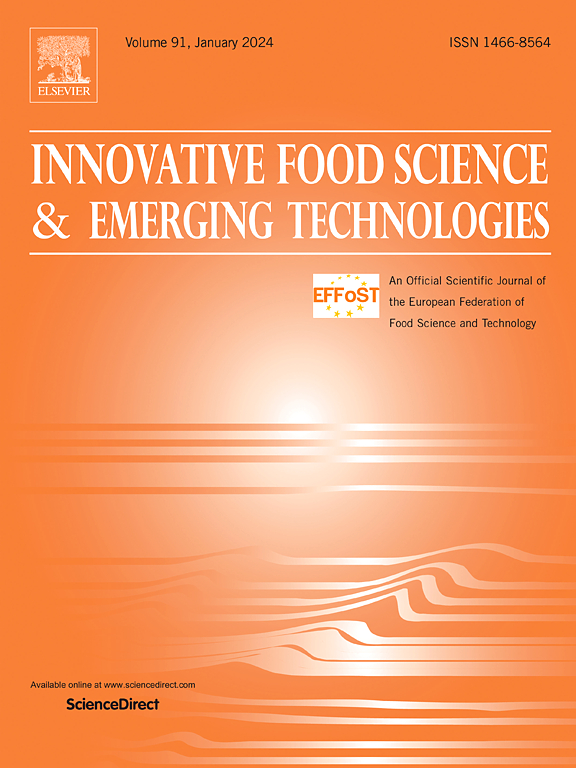A Deep-Sea probiotic platform: Dual-function biopreservation for aquaculture immunomodulation and meat shelf-life extension
IF 6.3
1区 农林科学
Q1 FOOD SCIENCE & TECHNOLOGY
Innovative Food Science & Emerging Technologies
Pub Date : 2025-07-02
DOI:10.1016/j.ifset.2025.104107
引用次数: 0
Abstract
Two major challenges in the food industry include antibiotic overuse in aquaculture and reliance on synthetic preservatives to increase meat shelf-life. To address these challenges, we developed a dual-function platform using Lactococcus lactis L25_4, isolated from 312-m depth in Taiwan's Taimali region. As a feed additive, L. lactis L25_4 significantly enhanced Litopenaeus vannamei (whiteleg shrimp) survival against Vibrio vulnificus infection by modulating gut microbiota (e.g., enriching Rhodobacteraceae and Streptococcaceae and inhibiting Desulfovibrionaceae and Klebsiella) and improving gut membrane integrity. It also upregulated immune genes (e.g., HSP70, Lysozyme C, SOD and Tollo) and increased short chain fatty acids (SCFAs) levels in the shrimp intestinal region. Transcriptomic and microbiome analyses revealed immune priming and stress mitigation, with Spearman correlations linking beneficial bacteria to enhanced gut integrity and immune activation. The cell-free supernatant (CFS) of L. lactis L25_4 was incorporated into a chitosan-based hydrogel and applied as a surface coating on raw pork meat. Samples were inoculated with Shewanella putrefaciens (106 CFU/mL), a known meat spoilage bacterium, and the CFS–chitosan hydrogel inhibited bacterial growth by >99 % for up to 5 days at 4 °C compared to untreated controls, as confirmed by CFU enumeration and Cryo-SEM imaging. L. lactis L25_4 demonstrated functional stability across aquaculture and chilled meat systems, supporting its dual application in biopreservation. By integrating multi-omics, biopolymer engineering, and pathogen inhibition assays, we present a scalable, nature-derived alternative to antibiotics and synthetic preservatives. This work advanced food science via a validated, application-ready platform aligned with One Health principles and offers a paradigm shift in sustainable biopreservation technologies.

深海益生菌平台:水产养殖免疫调节和肉类货架延长双重功能生物保存
食品工业面临的两大挑战包括水产养殖中抗生素的过度使用和依赖合成防腐剂来延长肉类的保质期。为了应对这些挑战,我们利用从台湾Taimali地区312米深处分离的乳酸乳球菌L25_4开发了一个双功能平台。乳酸菌L25_4作为饲料添加剂,通过调节肠道菌群(如丰富红杆菌科和链球菌科,抑制脱硫弧菌科和克雷伯氏菌)和改善肠道膜完整性,显著提高凡纳滨对虾(Litopenaeus vannamei)对创伤弧菌感染的存活率。它还上调了免疫基因(如HSP70、溶菌酶C、SOD和Tollo),并增加了虾肠区域的短链脂肪酸(SCFAs)水平。转录组学和微生物组学分析揭示了免疫启动和应激缓解,Spearman相关性将有益细菌与增强肠道完整性和免疫激活联系起来。将乳酸菌L25_4的无细胞上清(CFS)掺入壳聚糖基水凝胶中,涂在生猪肉表面。样品接种了已知的肉腐菌希瓦氏菌(106 CFU/mL), cfs -壳聚糖水凝胶在4°C下与未处理的对照组相比,可抑制细菌生长达99%,长达5天,CFU计数和冷冻扫描电镜成像证实了这一点。乳酸菌L25_4在水产养殖和冷冻肉系统中表现出功能稳定性,支持其在生物保鲜中的双重应用。通过整合多组学、生物聚合物工程和病原体抑制分析,我们提出了一种可扩展的、天然衍生的抗生素和合成防腐剂的替代品。这项工作通过与“一个健康”原则相一致的经过验证的应用就绪平台推进了食品科学,并提供了可持续生物保存技术的范式转变。
本文章由计算机程序翻译,如有差异,请以英文原文为准。
求助全文
约1分钟内获得全文
求助全文
来源期刊
CiteScore
12.00
自引率
6.10%
发文量
259
审稿时长
25 days
期刊介绍:
Innovative Food Science and Emerging Technologies (IFSET) aims to provide the highest quality original contributions and few, mainly upon invitation, reviews on and highly innovative developments in food science and emerging food process technologies. The significance of the results either for the science community or for industrial R&D groups must be specified. Papers submitted must be of highest scientific quality and only those advancing current scientific knowledge and understanding or with technical relevance will be considered.

 求助内容:
求助内容: 应助结果提醒方式:
应助结果提醒方式:


